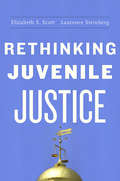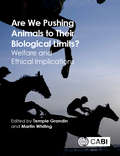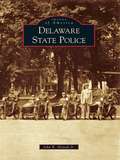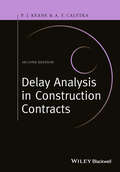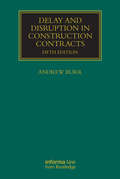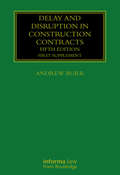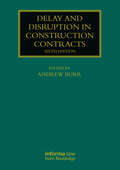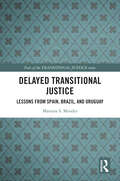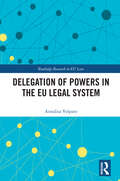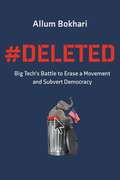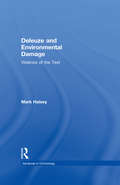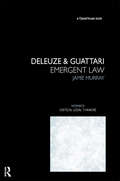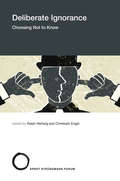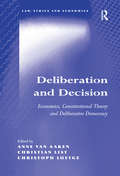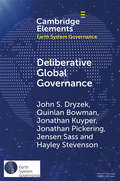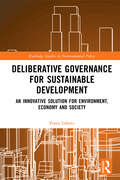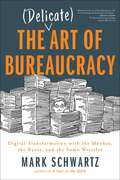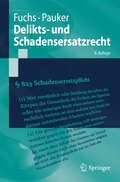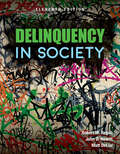- Table View
- List View
Degrees of Freedom: Louisiana and Cuba after Slavery
by Rebecca J. Scott Laurence D SteinbergAs Louisiana and Cuba emerged from slavery in the late nineteenth century, each faced the question of what rights former slaves could claim. Degrees of Freedom compares and contrasts these two societies in which slavery was destroyed by war, and citizenship was redefined through social and political upheaval. Both Louisiana and Cuba were rich in sugar plantations that depended on an enslaved labor force. After abolition, on both sides of the Gulf of Mexico, ordinary people-cane cutters and cigar workers, laundresses and labor organizers-forged alliances to protect and expand the freedoms they had won. But by the beginning of the twentieth century, Louisiana and Cuba diverged sharply in the meanings attributed to race and color in public life, and in the boundaries placed on citizenship. Louisiana had taken the path of disenfranchisement and state-mandated racial segregation; Cuba had enacted universal manhood suffrage and had seen the emergence of a transracial conception of the nation. What might explain these differences? Moving through the cane fields, small farms, and cities of Louisiana and Cuba, Rebecca Scott skillfully observes the people, places, legislation, and leadership that shaped how these societies adjusted to the abolition of slavery. The two distinctive worlds also come together, as Cuban exiles take refuge in New Orleans in the 1880s, and black soldiers from Louisiana garrison small towns in eastern Cuba during the 1899 U.S. military occupation. Crafting her narrative from the words and deeds of the actors themselves, Scott brings to life the historical drama of race and citizenship in postemancipation societies.
Degrowth, Depth and Hope in Sustainable Business: Reflections from Denmark, Finland and Sweden (Routledge Research in Sustainability and Business)
by Iana NesterovaThis book takes degrowth theorising in the direction of honouring collaboration, creating new dialogues and emphasising growth and human capacities. Traditionally, degrowth theorising has focussed on reduction and non‑growth. While the ecological concerns of degrowth scholarship are felt acutely by many, the suggestion of “less” can be experienced as undesirable, going against who we are as humans, and even be false in some industries and spaces. Indeed, for a degrowth society to come into being, unprecedented (though not materialistic) growth is needed. This book unpicks the business and sustainability framework rooted in degrowth scholarship and proposes a gentler approach to business for a sustainable society living harmoniously with nature. Drawing on case studies from Finland, Sweden and Denmark, Iana Nesterova reflects on how degrowth manifests in imperfect and nuanced ways and examines the ways in which businesses navigate creatively and cautiously challenging socio‑economic landscapes, and why they do this. She puts forward a new framework for growth within degrowth, centred around humanism and hope, which celebrates empathy, care, solidarity and connectedness with human and non‑human others and nature. Presenting an empowering and liberating view on sustainable business, this book will be of great interest to students and scholars of business ethics, ecological economics, business organisation and management.
Degrowth in Tourism: Welfare And Ethical Implications
by Temple Grandin Martin WhitingThis new text looks at the welfare problems and philosophical and ethical issues that are caused by changes made to an animal’s telos, behavior, and physiology (both positive and negative) to adapt them for human uses. <P><P>These changes may involve selective breeding for production, appearance traits, or competitive advantage in sport; transgenic animals; or the use of pharmaceuticals or hormones to enhance production or performance. Changes may impose duties to care for these animals further and more intensely, or they may make the animal more robust. <P><P>Considering a wide range of animals, including farm animals, companion animals, and laboratory animals, the book reviews the ethics and welfare issues of animals which have been adapted for sport, companions, toys, ornaments, food sources, weapons, and a whole host of other human functions. It will spark debate and is essential for all those involved in animal welfare and ethics, including veterinarians, animal scientists, animal welfare scientists, and ethologists.
Dehumanization of Warfare: Legal Implications of New Weapon Technologies
by Wolff Heintschel von Heinegg Robert Frau Tassilo SingerThis book addresses the technological evolution of modern warfare due to unmanned systems and the growing capacity for cyberwarfare. The increasing involvement of unmanned means and methods of warfare can lead to a total removal of humans from the navigation, command and decision-making processes in the control of unmanned systems, and as such away from participation in hostilities - the "dehumanization of warfare. " This raises the question of whether and how today's law is suitable for governing the dehumanization of warfare effectively. Which rules are relevant? Do interpretations of relevant rules need to be reviewed or is further and adapted regulation necessary? Moreover, ethical reasoning and computer science developments also have to be taken into account in identifying problems. Adopting an interdisciplinary approach the book focuses primarily on international humanitarian law, with related ethics and computer science aspects included in the discussion and the analysis.
Delaware Driver Manual: First Class Service from the First State
by Delaware Division of Motor VehiclesThis manual gives you information on safe driving rules and practices to help you become a safe driver. Be sure to read the manual carefully. Unless you know the information in this manual, you cannot pass our knowledge tests. This manual attempts to cover the major elements of Delaware law; however, it cannot cover all parts of federal or State law. If a conflict exists, then the actual code or legislation will always take precedence.
Delaware State Police (Images of America)
by John R. Alstadt Jr.April 28, 1923, marks the birth of the Delaware State Police. Discussions occurred as early as 1906 for a statewide police organization to cope with speeding automobiles, roving bands of troublemakers, and the ever-present bootleggers. Prohibition and the 18th Amendment brought the discussion to the forefront. With the hiring of Charles J. McGarigle and Joseph A. McVey, the Delaware Highway Police Department came to fruition on January 1, 1920. Using many never-before-published photographs from the Delaware State Police Museum archive, Images of America: Delaware State Police illustrates the storied past of the Delaware State Police from 1920 to 1985.
Delay Analysis in Construction Contracts
by Anthony F. Caletka P. John KeaneThe most significant unanticipated costs on many construction projects are the financial impacts associated with delay and disruption to the works. Assessing these, and establishing a causal link from each delay event to its effect, contractual liability and the damages experienced as a direct result of each event, can be difficult and complex.This book is a practical guide to the process of delay analysis and includes an in-depth review of the primary methods of delay analysis, together with the assumptions that underlie the precise calculations required in any quantitative delay analysis. The techniques discussed can be used on projects of any size, under all forms of construction contract, both domestic and international.The authors discuss not only delay analysis techniques, but also their appropriateness under given circumstances, demonstrating how combined approaches may be applied where necessary. They also consider problematic issues including 'who owns the float', concurrent delay, early completion programmes, and disruption. The book has been brought fully up to date, including references to the latest publications from the CIOB, AACEI and SCL, as well as current case law. Broad in scope, the book discusses the different delay analysis approaches likely to be encountered on national and international projects, and features practical worked examples and case studies demonstrating the techniques commonly used by experienced practitioners.This is an invaluable resource to programmers and schedulers, delay analysts, contractors, architects, engineers and surveyors. It will also be of interest to clients' professional advisors managing extension of time or delay claims, as well as construction lawyers who require a better understanding of the underlying assumptions on which many quantitative delay analyses are based.Reviews of First Edition"John Keane and Anthony Caletka are pukka analysts in that tricky area of delays, programming and extension of time. I highly recommend their book Delay Analysis in Construction Contracts. Buy the book." (Building Magazine, February 2009)"The book's stated purpose is to provide a practical guide for those interested in schedule delay analysis. It provides a good in-depth review of the most common delay analysis techniques.... An excellent book, full of practical tips for the reader and very timely in its publication. It is well worth the cost and a good read for anyone involved in schedule delay analysis." (Cost Engineering, February 2009)It achieves in spades its stated aim of being a practical guide for contractors, contract administrators, programmers and delay analysts, as well as construction lawyers who require a better understanding of the underlying assumptions on which many quantitative delay analyses are based. (Construction Law Journal, 2009)
Delay and Disruption in Construction Contracts: First Supplement (Construction Practice Series)
by Andrew BurrDelay and disruption in the course of construction impacts upon building projects of any scale. Now in its 5th edition Delay and Disruption in Construction Contracts continues to be the pre-eminent guide to these often complex and potentially costly issues and has been cited by the judiciary as a leading textbook in court decisions worldwide, see, for example, Mirant v Ove Arup [2007] EWHC 918 (TCC) at [122] to [135] per the late His Honour Judge Toulmin CMG QC. Whilst covering the manner in which delay and disruption should be considered at each stage of a construction project, from inception to completion and beyond, this book includes: An international team of specialist advisory editors, namely Francis Barber (insurance), Steve Briggs (time), Wolfgang Breyer (civil law), Joe Castellano (North America), David-John Gibbs (BIM), Wendy MacLaughlin (Pacific Rim), Chris Miers (dispute boards), Rob Palles-Clark (money), and Keith Pickavance Comparative analysis of the law in this field in Australia, Canada, England and Wales, Hong Kong, Ireland, New Zealand, the United States and in civil law jurisdictions Commentary upon, and comparison of, standard forms from Australia, Ireland, New Zealand, the United Kingdom, USA and elsewhere, including two major new forms New chapters on adjudication, dispute boards and the civil law dynamic Extensive coverage of Building Information Modelling New appendices on the SCL Protocol (Julian Bailey) and the choice of delay analysis methodologies (Nuhu Braimah) Updated case law (to December 2014), linked directly to the principles explained in the text, with over 100 helpful "Illustrations" Bespoke diagrams, which are available for digital download and aid explanation of multi-faceted issues This book addresses delay and disruption in a manner which is practical, useful and academically rigorous. As such, it remains an essential reference for any lawyer, dispute resolver, project manager, architect, engineer, contractor, or academic involved in the construction industry.
Delay and Disruption in Construction Contracts: First Supplement (Construction Practice Ser.)
by Andrew Burr Annabella Matute Castro Clelia ZottiDelay and disruption in the course of construction impacts upon building projects of any scale. Now in its 5th edition Delay and Disruption in Construction Contracts continues to be the pre-eminent guide to these often complex and potentially costly issues and has been cited by the judiciary as a leading textbook in court decisions worldwide, see, for example, Mirant v Ove Arup [2007] EWHC 918 (TCC) at [122] to [135] per the late His Honour Judge Toulmin CMG QC. Whilst covering the manner in which delay and disruption should be considered at each stage of a construction project, from inception to completion and beyond, this book includes: An international team of specialist advisory editors, namely Francis Barber (insurance), Steve Briggs (time), Wolfgang Breyer (civil law), Joe Castellano (North America), David-John Gibbs (BIM), Wendy MacLaughlin (Pacific Rim), Chris Miers (dispute boards), Rob Palles-Clark (money), and Keith Pickavance Comparative analysis of the law in this field in Australia, Canada, England and Wales, Hong Kong, Ireland, New Zealand, the United States and in civil law jurisdictions Commentary upon, and comparison of, standard forms from Australia, Ireland, New Zealand, the United Kingdom, USA and elsewhere, including two major new forms New chapters on adjudication, dispute boards and the civil law dynamic Extensive coverage of Building Information Modelling New appendices on the SCL Protocol (Julian Bailey) and the choice of delay analysis methodologies (Nuhu Braimah) Updated case law (to December 2014), linked directly to the principles explained in the text, with over 100 helpful "Illustrations" Bespoke diagrams, which are available for digital download and aid explanation of multi-faceted issues This book addresses delay and disruption in a manner which is practical, useful and academically rigorous. As such, it remains an essential reference for any lawyer, dispute resolver, project manager, architect, engineer, contractor, or academic involved in the construction industry.
Delay and Disruption in Construction Contracts (Construction Practice Series)
by Andrew Burr Annabella Matute-CastroNow in its sixth edition, Delay and Disruption in Construction Contracts retains its position as foremost guide to the complex issues arising in the course of construction, with robustly-updated content throughout and the addition of several new chapters with focus on such topics as standard form provisions for recovery of loss or expense, and Chinese and Peruvian construction law.Expertly covering the manner in which delay and disruption should be considered at each stage of a construction project, from inception to completion and beyond, this book includes: Insight from an international team of specialist advisory editors Comparative analysis of the law in this field in Australia, Canada, England and Wales, Hong Kong, Ireland, New Zealand, the United States and in civil law jurisdictions Commentary upon, and comparison of, standard forms from Australia, Ireland, New Zealand, the United Kingdom, USA and elsewhere, including two major new forms Chapters on adjudication, dispute boards and the civil law dynamic Extensive coverage of Building Information Modelling New chapters on Chinese, Nordic, Peruvian, Singaporean and Malaysian construction law New in-depth discussion of the JCT 2016 suite Updated case law, linked directly to the principles explained in the text. This book is an essential reference for any lawyer, dispute resolver, project manager, architect, engineer, contractor, or academic involved in the construction industry.
Delayed Transitional Justice: Lessons from Spain, Brazil, and Uruguay
by Mariana S. MendesThis book addresses the issue of the timing of transitional justice policies in countries that had negotiated transitions from authoritarianism to democracy. Why are transitional justice measures often being implemented decades after the events they refer to? More specifically, what combination of factors leads to the implementation of transitional justice policies at certain moments in time? And, what explains countries’ different choices and trajectories? To address these questions, this book pursues a comparative analysis of three cases: comparing a case of ‘robust’ implementation of transitional justice measures (Uruguay), a case where only victim-centered measures were approved (Spain), and a case that sits in between these two (Brazil). Through an in-depth empirical analysis of these specific country-cases, and focusing on seven different transitional justice initiatives, the book identifies the determinants behind delayed transitional justice policies and explains why such policies are more robust in some settings than in others. In doing so, it provides a holistic account of post-transitional justice outcomes, offering more general conclusions and insights about the study of the drivers of transitional justice. This book will appeal to scholars and students of transitional justice in politics, law, and sociology, as well as to policymakers involved in the implementation and administration of transitional justice measures.
Delegation of Powers in the EU Legal System (Routledge Research in EU Law)
by Annalisa VolpatoThe majority of rules adopted at the EU level are not issued by democratically elected institutions, but rather by administrative bodies which are empowered to exercise rule-making powers by legislative acts. This book analyses the legal mechanism through which these powers are conferred on the most relevant bodies in the EU institutional landscape, namely the European Commission, the Council, the ECB and EU agencies, and the democratic controls in place to limit and oversee the exercise of these powers. Providing an overarching perspective of the delegation of powers, this book reflects on the notion of delegation and on the commonalities between the different forms of delegation identified. It focuses on the legal requirements and limits for the delegating act, the procedures for the exercise of such powers, the position of the acts in the hierarchy of norms, and their judicial review. Overcoming the fragmentation which characterized the development of the different forms of delegation in the EU, this analysis provides a clear, structured, and coherent picture of the legal framework for the delegation of powers in the light of the constitutional principles of this legal system. Academics and practitioners will equally appreciate this highly accessible addition to the current debate in legal scholarship of the delegation of powers in the EU, as well as its explanations on comitology and the empowerment of EU agencies.
Delete: The Virtue of Forgetting in the Digital Age
by Viktor Mayer-SchönbergerThe hazards of perfect memory in the digital ageDelete looks at the surprising phenomenon of perfect remembering in the digital age, and reveals why we must reintroduce our capacity to forget. Digital technology empowers us as never before, yet it has unforeseen consequences as well. Potentially humiliating content on Facebook is enshrined in cyberspace for future employers to see. Google remembers everything we've searched for and when. The digital realm remembers what is sometimes better forgotten, and this has profound implications for us all.In Delete, Viktor Mayer-Schönberger traces the important role that forgetting has played throughout human history, from the ability to make sound decisions unencumbered by the past to the possibility of second chances. The written word made it possible for humans to remember across generations and time, yet now digital technology and global networks are overriding our natural ability to forget—the past is ever present, ready to be called up at the click of a mouse. Mayer-Schönberger examines the technology that's facilitating the end of forgetting—digitization, cheap storage and easy retrieval, global access, and increasingly powerful software—and describes the dangers of everlasting digital memory, whether it's outdated information taken out of context or compromising photos the Web won't let us forget. He explains why information privacy rights and other fixes can't help us, and proposes an ingeniously simple solution—expiration dates on information—that may.Delete is an eye-opening book that will help us remember how to forget in the digital age.
#DELETED: Big Tech's Battle to Erase a Movement and Subvert Democracy
by Allum BokhariThe most powerful tech companies in the world are determined to stop Donald Trump.Journalist Allum Bokhari has spent four years investigating the tech giants that dominate the Internet: Google, Facebook, YouTube, Twitter. He has discovered a dark plot to seize control of the flow of information, and utilize that power to its full extent - to censor, manipulate, and ultimately sway the outcome of democratic elections. His network of whistleblowers inside Google, Facebook and other companies explain how the tech giants now see themselves as "good censors," benevolent commissars controlling the information we receive to "protect" us from "dangerous" speech.They reveal secret methods to covertly manipulate online information without us ever being aware of it, explaining how tech companies can use big data to target undecided voters. They lift the lid on a plot four years in the making - a plot to use the power of technology to stop Donald Trump's re-election.
Deleuze and Environmental Damage: Violence of the Text (New Advances in Crime and Social Harm)
by Mark HalseyThis book offers a post-structuralist critique of the problems associated with modernist accounts of environmental harm and regulation. Through a notably detailed micro-political analysis of forest conflict, the author explores the limits of academic commentary on environmental issues and suggests that the traditional variables of political economy, race and gender need to be recast in light of four key modalities through which 'the environment' and 'environmental damage' are (re)produced. Focusing on vision, speed, lexicon and affect, the book engages a new ethic for categorizing and regulating 'nature' and challenges criminologists, sociologists, cultural theorists and others to reconsider what it is possible to say and do about environmental problems.
Deleuze & Guattari: Emergent Law (Nomikoi: Critical Legal Thinkers)
by Jamie MurrayDeleuze & Guattari: Emergent Law is an exposition and development of Deleuze & Guattari's legal theory. Although there has been considerable interest in Deleuze & Guattari in critical legal studies, as well as considerable interest in legality in Deleuze & Guattari studies, this is the first book to focus exclusively on Deleuze & Guattari and law. Situating Deleuze & Guattari's engagement with social organisation and legality in the context of their theory of 'abstract machines' and 'intensive assemblages', Jamie Murray presents their theory of law as that of a two-fold conception of, first, a transcendent molar law and, second, an immanent molecular emergent law. Transcendent molar legality is the traditional object of legal theory. And, as explicated here, immanent molecular emergent law is the novel juridical object that Deleuze & Guattari identify. Developing this conception, Deleuze & Guattari: Emergent Law draws out its implications for current and for future legal theory; arguing that it provides the basis for a new jurisprudence capable of creating new concepts of legality.
Deleveraging after Lehman--Evidence from Reduced Rehypothecation
by Manmohan Singh James AitkenA report from the International Monetary Fund.
Deliberate Ignorance: Choosing Not to Know (Strüngmann Forum Reports #29)
by Ralph Hertwig Christoph EngelPsychologists, economists, historians, computer scientists, sociologists, philosophers, and legal scholars explore the conscious choice not to seek information.The history of intellectual thought abounds with claims that knowledge is valued and sought, yet individuals and groups often choose not to know. We call the conscious choice not to seek or use knowledge (or information) deliberate ignorance. When is this a virtue, when is it a vice, and what can be learned from formally modeling the underlying motives? On which normative grounds can it be judged? Which institutional interventions can promote or prevent it? In this book, psychologists, economists, historians, computer scientists, sociologists, philosophers, and legal scholars explore the scope of deliberate ignorance.
Deliberation and Decision: Economics, Constitutional Theory and Deliberative Democracy (Law, Ethics and Economics)
by Anne van Aaken Christian ListDeliberation and Decision explores ways of bridging the gap between two rival approaches to theorizing about democratic institutions: constitutional economics on the one hand and deliberative democracy on the other. The two approaches offer very different accounts of the functioning and legitimacy of democratic institutions. Although both highlight the importance of democratic consent, their accounts of such consent could hardly be more different. Constitutional economics models individuals as self-interested rational utility maximizers and uses economic efficiency criteria such as incentive compatibility for evaluating institutions. Deliberative democracy models individuals as communicating subjects capable of engaging in democratic discourse. The two approaches are disjointed not only in terms of their assumptions and methodology but also in terms of the communication - or lack thereof - between their respective communities of researchers. This book provides a comprehensive overview of the recent debate between the two approaches and makes new and original contributions to that debate.
Deliberative Global Governance (Elements in Earth System Governance)
by John S. Dryzek Quinlan Bowman Jonathan Kuyper Jonathan Pickering Jensen Sass Hayley StevensonGlobal institutions are afflicted by severe democratic deficits, while many of the major problems facing the world remain intractable. Against this backdrop, we develop a deliberative approach that puts effective, inclusive, and transformative communication at the heart of global governance. Multilateral negotiations, international organizations and regimes, governance networks, and scientific assessments can be rendered more deliberative and democratic. More thoroughgoing transformations could involve citizens' assemblies, nested forums, transnational mini-publics, crowdsourcing, and a global dissent channel. The deliberative role of global civil society is vital. We show how different institutional and civil society elements can be linked to good effect in a global deliberative system. The capacity of deliberative institutions to revise their own structures and processes means that deliberative global governance is not just a framework but also a reconstructive learning process. A deliberative approach can advance democratic legitimacy and yield progress on global problems such as climate change, violent conflict and poverty.
Deliberative Governance for Sustainable Development: An Innovative Solution for Environment, Economy and Society (Routledge Studies in Environmental Policy)
by Franz LehnerDeliberative Governance for Sustainable Development argues that governance has become the core problem of sustainable development and identifies deliberative democracy and governance as a path forward for Western societies. In this book the author puts forward three messages. Firstly, while sustainable development theoretically is a common good of all people, it is in practice constantly associated with a multitude of smaller and larger conflicts. These conflicts arise repeatedly because, in practice, the benefits, costs and risks of sustainable development are unequally distributed and therefore form a massive barrier to sustainable development. As a result, sustainable development depends on the ability of the social and political institutions of societies to accommodate these conflicts. Second, within the framework of their established institutional structures, Western societies do not have the sufficient tools for conflict resolution that are adequate to the conditions of modern diversified societies and the complex challenges of sustainable development. They need to implement institutional reforms that switch institutional structures towards deliberation. Third, by switching to deliberation, Western societies can reach the high level of governance that enables them to achieve environmentally sustainable development that will bring them significant economic and social benefits and, as a result, may reach far beyond their borders. This volume offers a novel, transdisciplinary approach to sustainable development and governance in Western societies. It will be of great interest to students and scholars of sociology, economics, politics, environmental studies and philosophy, as well as professionals and policymakers working in the area of sustainable development.
The Delicate Art of Bureaucracy: Digital Transformation with the Monkey, the Razor, and the Sumo Wrestler
by Mark Schwartz Mark SchwartzMark Schwartz, author of leadership classics A Seat at the Table and The Art of Business Value, reveals a new (empowering) model for the often soul-shattering, frustrating, Kafkaesque nightmare we call bureaucracy. Through humor, a healthy dose of history and philosophy, and real-life examples from his days as a government bureaucrat, Schwartz shows IT leaders (and the whole of business) how to master the ways of the Monkey, the Razor, and the Sumo Wrestler to create a lean, learning, and enabling bureaucracy. For anyone frustrated by roadblocks, irritated the business can't move fast enough, or suffering under the weight of crushing procedures, this book is for you. No matter your role, you need a playbook for bureaucracy. This is it. With this playbook, you can wield bureaucracy as a superpower and bust through it at the same time
Delikts- und Schadensersatzrecht
by Maximilian Fuchs Werner PaukerWie kaum ein anderes Rechtsgebiet des BGB sind das Deliktsrecht und das Schadensersatzrecht von der Rechtsprechung geprägt. Darum werden die wichtigsten Entscheidungen mit Sachverhalt und Entscheidungsgründen berücksichtigt. Damit bietet das Lehrbuch eine lebendige Erörterung des Stoffes. Rechtsprechung und Literatur wurden gegenüber der Vorauflage umfassend ausgewertet und aktualisiert.
The Delimitation of the Continental Shelf between Denmark, Germany and the Netherlands
by Alex G. Oude ElferinkAlex G. Oude Elferink's detailed analysis of the negotiations between Denmark, Germany and The Netherlands concerning the delimitation of their continental shelf in the North Sea makes use of the full range of government archives in these three States. He looks at the role of international law in policy formulation and negotiations, and explores the legal context, political considerations and, in particular, oil interests which fed into these processes. He also explains why the parties decided to submit their disputes to the International Court of Justice and looks at the preparation of their pleadings and litigation strategy before the Court. The analysis shows how Denmark and The Netherlands were able to avoid the full impact of the implications of the Court's judgment by sidestepping legal arguments and insisting instead on political considerations.
Delinquency in Society
by null Robert M. Regoli null John D. Hewitt Null Matt DeLisiDelinquency in Society, Eleventh Edition provides in-depth, research-oriented coverage of the essential delinquency topics and theories, including juvenile delinquency, criminal behavior, and status-offending youths. With high quality photos, images, and learning features throughout, the updated Eleventh Edition continues to showcase the most current research and practice to prevent, treat, and respond to juvenile delinquency in an approachable design and clear writing style. The Eleventh Edition features unparalleled historical coverage of criminological theory based on over 100 years of cumulative teaching and research experience by the authors. New sections on hot topics, including health criminology, vaping and its association with delinquency, adverse childhood experiences, the expansion of NIBRS in measuring delinquency, and more timely discussions, help to make the best-selling Delinquency in Society the clear choice for delinquency courses.
